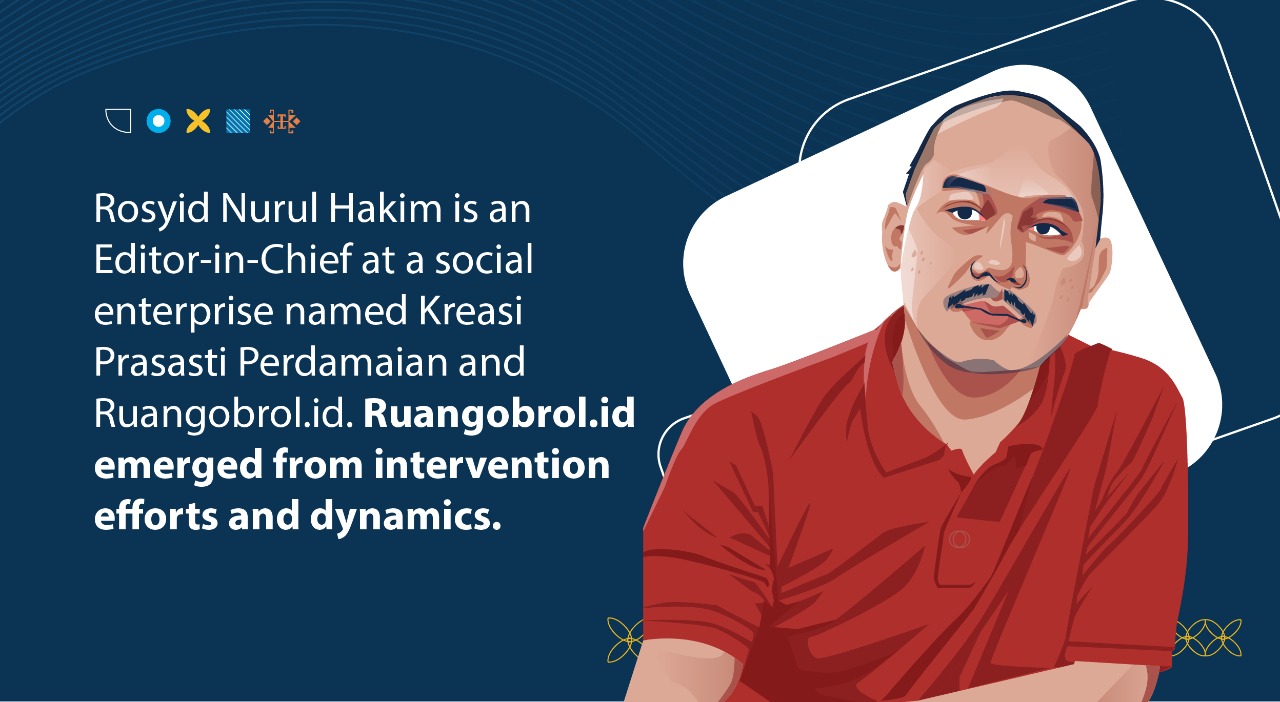Q: What is the initiative of Ruangobrol.id? What does your scope of work look like?
A: My name is Rosyid Nurul Hakim, I am the Editor-in-Chief at a social enterprise, named Ruangobrol.id. We made Ruangobrol.id as an alternative narrative or information curation that related to P/CVE issues. Hopefully, Ruangobrol can be a good medium and community for former terrorist inmates.
Ruangobrol.id emerged from intervention efforts and dynamics. In 2018, we created a new approach, gathering ustad and ustadzah (religious leaders) who are usually invited to attend seminars, but we provided a communication workshop instead. These religious leaders and ex-prisoners have never met before. If we let them discuss by themselves, the discussion will lead off-topic, and the ex-prisoner will most likely try to glorify their past skills and accomplishments, such as having the ability to make bombs, etc. Here, Ruangobrol exists to give them communication skills, especially through audio/visual skills.
Q: What are the practices of Ruangobrol?
There are alumni from the P/CVE communication workshop who actively fill in the contents of Ruangobrol.id, such as Dhania and Cak Arif. Now, the vision is to give an explanation to the public regarding the issue of radicalism and terrorism. Why just an explanation? Because we do not want to point blame those who have joined a radical group-if we talk about terrorism like this, we don’t go anywhere, the problem is still there. We try as much as possible not to blame other people. Meanwhile, I see that the distortion of understanding this issue in the public is quite diverse.
Ruangobrol.id is not yet a solution, we are still learning to do problem-solving. We are always experimenting with content for the public. Not only does Ruangobrol.id raise the issue of radicalism and terrorism, but we also match it with the current trends. We use SEO, riding the trends, which suits the current audience. The objective now is that we will not only have terrorism studies students from well-known universities who visit Ruangobrol.id, but also students from other majors who are interested to discuss PVE issues by visiting our website. Therefore, the content in Ruangobrol.id not only raises the issue of radicalism and terrorism but is also routinely linked to current trends, such as K-Pop, etc. We could see that the statistic of visitors to the site has increased by applying this method.
Ruangobrol itself does not consist of online intervention only- online is important, but offline efforts can not be forgotten. Both must have equal portions.
Offline: look for people who support ISIS and try to pull them out of there. We try to bring together people who just got out of ISIS with mentors that can help them. Offline is the most successful casual approach, the offline approach is better because the trust process can be felt by the person themself, rather than online. Throughout all my time working with these issues, I see that many people/institutions handle radicalism and terrorism with much focus on the perpetrators. It doesn’t always have to go that way- we need to educate society about the importance of PVE issues and how to handle them. We are currently in the process of making a capacity building training for RT/RW (small community leader) who will later receive an ex-prisoner. The RT/RW’s involved will be equipped with these 3 points:
- Knowledge: explanation of this problem and PVE issues.
- Skills: communication, active listening, understanding gender dynamics.
- Understanding: shared understanding. At the end there will be a module and a roadmap itself.
Online: create narratives, promote narratives to the public, observe who consumes the narratives, and observe the behaviour of ISIS. Covid-19 encourages more online activities.
Q: How do you see the trend of online narratives during this Covid-19 pandemic?
A: There has not been so much change in terms of quantity. They (ISIS) have always used underground lines in promoting their efforts. Apparently, they use interesting narratives during this pandemic. For example, ISIS itself issued a fatwa (a belief based on Islamic law) that this is a good opportunity to weaken all countries.
Other interesting information we got is that some people said that Covid is help from God to crush America. They see that Covid is not something to be feared, in fact, they believe it is an opportunity. For example, this belief has been related to the increase of violence in several regions in Indonesia, and is one of the reasons for the attacks in Poso. The impact has been immediate in Indonesia. Above all, digital literacy is very important to prevent those VE narratives.
Q: Do Ruangobrol.id’s friends prepare counter-narratives or create alternative narratives to answer these narratives of extremism groups?
A: Direct counter-narrative is useless. We believe in building trust, instead. We try to create a digital persona. Ruangobrol writings resonate with black and white public writing about PVE issues. By doing this, we try to push this issue to be more popular in public debate.
Q: How to build trust from people who are at risk of radicalism and terrorism?
A: Online: our consistency to provide a narrative about radicalism and terrorism with a certain angle. For example when there is a case of arrest, we capture the family story. There is also a chat facility on our website to help anyone who wants to tell their story. Online trust is more difficult than offline. To get attention from people we can use online efforts, but to have people genuinely believe in us, there needs to be further connection.
Offline: we have to be friends with the victim. Also, take note that we cannot gain trust from people who don’t have a willingness to be open and share their story. For example, Cak Arif or Arif Budi Setiawan, is one success story, because he was the one who came to us first, asked for help, and we were glad to provide that. You can read his profile (Arif Budi Setiawan or Cak Arif) on Republika.

